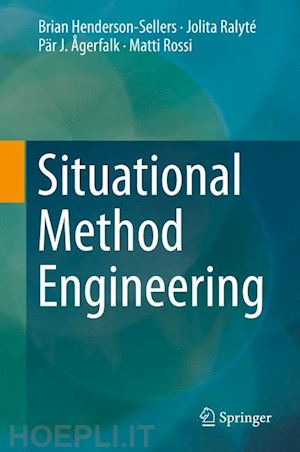

Questo prodotto usufruisce delle SPEDIZIONI GRATIS
selezionando l'opzione Corriere Veloce in fase di ordine.
Pagabile anche con Carta della cultura giovani e del merito, 18App Bonus Cultura e Carta del Docente
While previously available methodologies for software – like those published in the early days of object technology – claimed to be appropriate for every conceivable project, situational method engineering (SME) acknowledges that most projects typically have individual characteristics and situations. Thus, finding the most effective methodology for a particular project needs specific tailoring to that situation. Such a tailored software development methodology needs to take into account all the bits and pieces needed for an organization to develop software, including the software process, the input and output work products, the people involved, the languages used to describe requirements, design, code, and eventually also measures of success or failure.
The authors have structured the book into three parts. Part I deals with all the basic concepts, terminology and overall ideas underpinning situational method engineering. As a summary of this part, they present a formal meta-model that enables readers to create their own quality methods and supporting tools. In Part II, they explain how to implement SME in practice, i.e., how to find method components and put them together and how to evaluate the resulting method. For illustration, they also include several industry case studies of customized or constructed processes, highlighting the impact that high-quality engineered methods can have on the success of an industrial software development. Finally, Part III summarizes some of the more recent and forward-looking ideas.
This book presents the first summary of the state of the art for SME. For academics, it provides a comprehensive conceptual framework and discusses new research areas. For lecturers, thanks to its step-by-step explanations from basics to the customization and quality assessment of constructed methods, it serves as a solid basis for comprehensive courses on the topic. For industry methodologists, it offers a reference guide onfeatures and technologies to consider when developing in-house software development methods or customising and adopting off-the-shelf ones.Brian Henderson-Sellers is Director of the Centre for Object Technology Applications and Research and Professor of Information Systems at the University of Technology, Sydney. He has authored over a dozen books on object and agent technologies and is well-known for his work in OO methodologies and in OO metrics. In 1999, he was voted number 3 in the Who’s Who of Object Technology. Brian has been a member of the Review Panel for the OMG’s Software Process Engineering Model standards initiative and a member of the UML2.0 review team, was General Chair of the IFIP WG8.1 Working Conference on Method Engineering and is Co-Editor of the ISO/IEC 24744 International Standard “Software Engineering Metamodel for Development Methodologies”.
Jolita Ralyté is a senior researcher and lecturer at the University of Geneva’s Department of Information Systems. Her research areas include situational method engineering, information systems development methods, information systems evolution and interoperability, requirement engineering, and services science. Currently she is a Vice-Chair of the IFIP WG 8.1 and leads the Method Engineering Task Group within the IFIP WG 8.1.
Pär Ågerfalk is a professor at Uppsala University’s Department of Informatics and Media, where he holds the Chair of Computer Science in Intersection with Social Sciences. His research on open source software development, open innovation, globally distributed and flexible software development, conceptual modelling and method engineering has appeared in a number of leading journals and conferences.
Matti Rossi is a professor of information systems at Aalto University School of Economics. He has been involved in the development of research prototypes and commercial products, including MetaEdit Personal, a single user CASE tool, and MetaEdit+, a multi-user integrated CASE tool, selected among the three most innovative new software tools at CeBIT 95 by Byte and used for thedevelopment of user interfaces for Nokia’s latest generations of mobile phones.










Il sito utilizza cookie ed altri strumenti di tracciamento che raccolgono informazioni dal dispositivo dell’utente. Oltre ai cookie tecnici ed analitici aggregati, strettamente necessari per il funzionamento di questo sito web, previo consenso dell’utente possono essere installati cookie di profilazione e marketing e cookie dei social media. Cliccando su “Accetto tutti i cookie” saranno attivate tutte le categorie di cookie. Per accettare solo deterninate categorie di cookie, cliccare invece su “Impostazioni cookie”. Chiudendo il banner o continuando a navigare saranno installati solo cookie tecnici. Per maggiori dettagli, consultare la Cookie Policy.